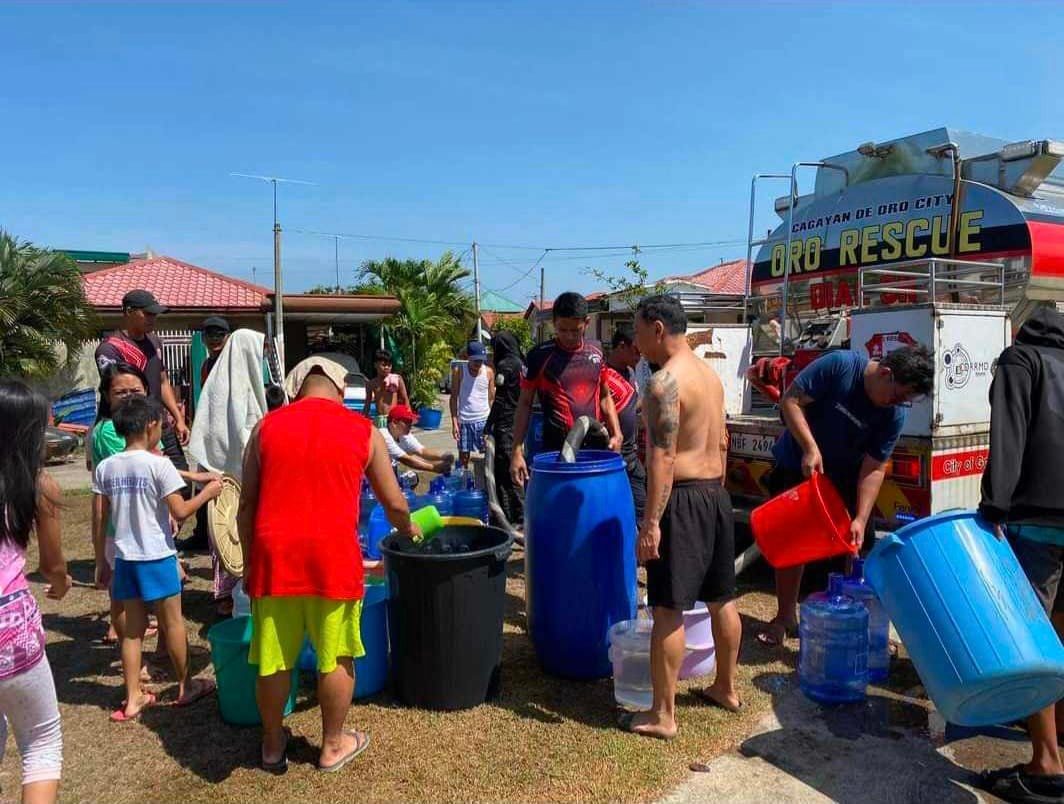SUMMARY
This is AI generated summarization, which may have errors. For context, always refer to the full article.

CAGAYAN DE ORO, Philippines – Cagayan de Oro Mayor Rolando Uy assured thousands of residents on Wednesday, March 6, that their taps will not run dry even if the city’s primary bulk water supplier makes good on its threat to immediately halt the supply of water should the Cagayan de Oro Water District (COWD) fail to pay for a disputed debt of more than P400 million by April 1.
Uy told a news conference that another group would take the place of the supplier, Cagayan de Oro Bulk Water Incorporated (COBI).
“Naa ko’y suod nga higala nga andam motabang aron dili maputlan ang tubig sa dakbayan (I have a close friend who is ready to help so that the city’s water supply will not be interupted)” Uy said.
COBI, a company controlled by business tycoon Manny V. Pangilinan’s Metro Pacific group, supplies some 80,000 cubic meters of treated water daily to the COWD, which the latter distributes throughout the city.
The COBI water supply, which it sources from the Bubunawan River in neighboring Bukidnon province, accounts for about half of Cagayan de Oro’s water supply. The remainder is produced by COWD through its ground sources and other bulk water suppliers.
Uy gave the assurance following the escalation of the rate and billing dispute between the COWD and COBI. The bulk water supplier had sent the COWD a second demand letter dated February 29 asking the water utility to pay up or else.
Engineer Antonio Young, COWD’s general manager, has questioned COBI’s demand for the water district to pay its supposed debt.
Young said the water district has not been remiss in paying COBI for the bulk water supply at the agreed rate of P16.60 per cubic meter.
He pointed out that the amount in question includes the rate differential from COBI’s 2021 rate increase, which they were still trying to renegotiate.
Uy declined to name his “close friend,” whom he also called his “long-time ally.” The mayor did not say if the prospective supplier was capable of producing the same volume of treated water that COBI supplies to the COWD, and neither did he say what the cost would be to Cagayan de Oro’s consumers.
The looming crisis has prompted Uy to create a special task force “to study, review, and submit recommendations on the possible intervention of the city government” in relation to the conditions of the water supply and distribution in the city.
Created through an executive order signed on Wednesday, the Cagayan de Oro Special Task Force for Water Supply and Distribution will also look into the conflict over rates between the water utility and its bulk water supplier.
Uy told reporters that the task force will also “conduct an inventory of alternative water sources to serve the constituents of the city and formulate a contingency plan in the event of massive water supply disruption.”
If necessary, Uy said, the task force will scrutinize the contract between the COWD and COBI.
COBI has been the major bulk water supplier in the city since 2018 based on a joint venture agreement for the supply of 100 million liters per day signed on August 14, 2017, between the COWD and Pangilinan’s Metro Pacific Water.
Three days later, the then-newly formed COBI, which gave the COWD a 5% share, signed a bulk water supply deal with the water district at a rate of P16.60 per cubic meter.
The bulk water supply contract, however, allows COBI to unilaterally implement a rate adjustment every three years.
In 2021, COBI raised its rate from P16.60 to P20.57 per cubic meter. However, the COWD did not acknowledge it and refused to pay the rate difference, invoking a force majeure provision in the contract due to the COVID-19 pandemic emergency situation.
It is this non-payment of the rate difference that constitutes the bulk of the P426 million that COBI wants to collect from the COWD. – Rappler.com
JB Deveza is an Aries Rufo Journalism fellow for 2023-2024.
Add a comment
How does this make you feel?
There are no comments yet. Add your comment to start the conversation.